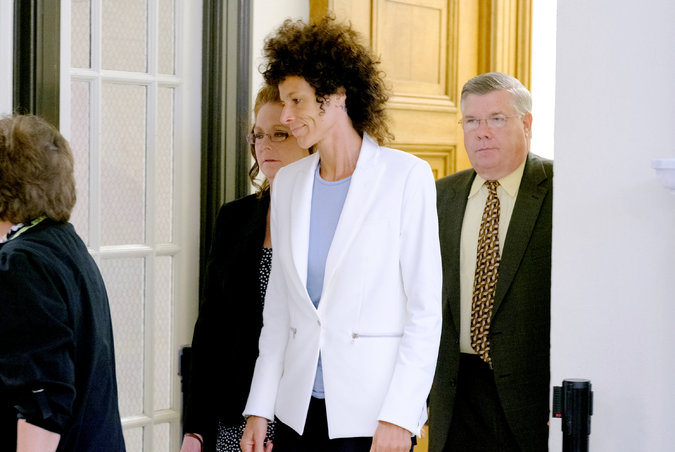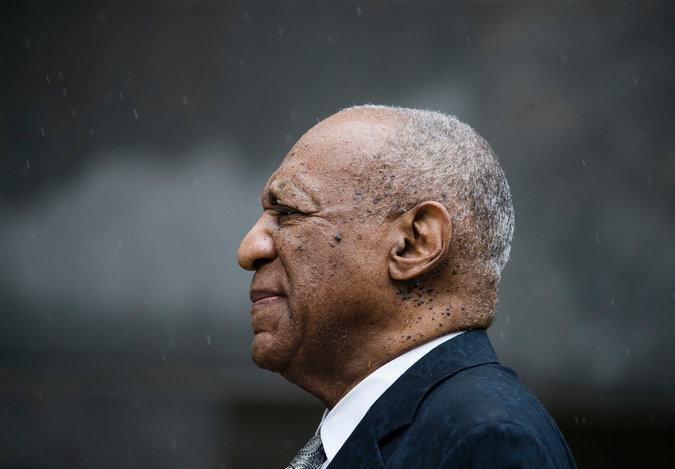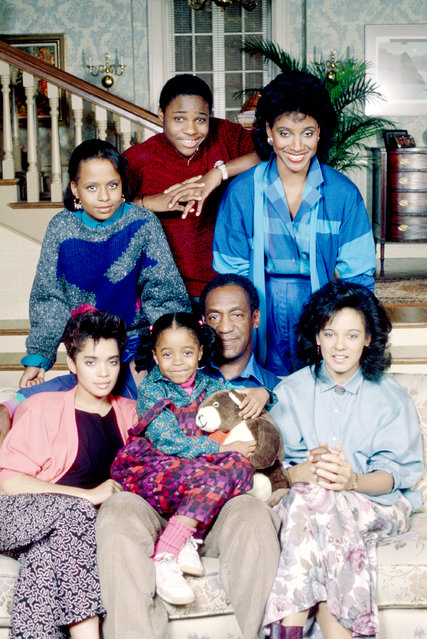MORRIS Oh, feelings. They obviously had a role to play in this case and yet aren’t the usual basis for a legal strategy. So little of this trial was concrete. Mr. Cosby didn’t take the stand in his defense, which meant the case, in some sense, came down to Ms. Constand’s recollection versus his legacy.
Advertisement
Continue reading the main story
WORTHAM As soon as the push notification announcing the outcome of the trial arrived on my iPhone, I began obsessing over what part of the trial cast enough doubt to some of those 12 people. The answer is important, because it reveals so much about our culture’s relationship to women and how they are supposed to function within systems of power. What about Ms. Constand gave the jury pause? Her sexual identity? Her decision to trust Mr. Cosby? Her inability to recall the exact details of being drugged? Her initial reluctance to take legal action against someone she considered to be a friend, with the only thing compelling her to speak out being the deep knot in her gut that something happened that night that was not right? To me, she seemed to be trying to make the best decision possible at every moment, and abiding by a simple trust: that each of us lives according to a moral code that keeps us from harming one another unnecessarily.
MORRIS Too true. I’ll also tell you that this case has done a number on my 88-year-old grandmother and her 73-year-old baby sister. They sided with Mr. Cosby, partly because we’re from Philadelphia, where it’s cheesesteaks, Ben Franklin and Bill Cosby. But the bulk of my family’s support comes from being black women who’ve seen too many black men and women harassed by the city and the courts. When I talked with them about the case, we talked about the evidence. But we also talked about a history of feelings. And how a lot of their alignment has to do with the awareness that the criminal justice system tends to disfavor black people.
The travails of regular civilians might seem entirely separate from Mr. Cosby, who is American royalty. And I didn’t see race as a factor, even though many of his accusers are white. He made a case for integration on “I Spy” and exemplified black decency on “The Cosby Show.” His meaning as a uniter of all people might have made it tough to believe that he would abuse that power.

But any time a black person is on trial, there’s a sinking feeling that blackness might be on trial, too.
WORTHAM Oh man. The degree to which your point — “any time a black person’s on trial, there’s a sinking feeling that blackness might be on trial” — had escaped me is slightly embarrassing. That’s exactly it. Mr. Cosby has not been part of the conversation around blackness and identity for decades, but his life means very much to those who remember feeling validated and vindicated by his presence during his heyday. A Cosby conviction would require a rebuilding of infrastructure too fraught to replace — his legacy spanned too many years, his foundation too fundamental to unearth.
MORRIS There’s also something potentially toxic about the mix of black men, white women, power and celebrity that we keep reliving, whether it’s famous entertainers or college athletes. We believe in black-white interracial romantic relationships, and yet there’s something fishy about them, too (see this season’s “The Bachelorette”). The year’s biggest sleeper hit, “Get Out,” is a movie about that very fishiness. That distrust comes from a long history of black men falsely being accused of raping white women. And even though no one has said a word about that history, it’s hard to read about this trial and not feel nausea.
WORTHAM You’re right — it’s there, lurking. This question brings me back to the moment in “O.J.: Made in America,” Ezra Edelman’s phenomenal documentary from last year, when black jurors reveal that their decision to acquit O.J. Simpson was framed partly as retribution for the police beating of Rodney King. A community activist, Danny Bakewell, says, “Now you know how it feels.”
Mr. Cosby isn’t O.J. — but is there anything more telling than the statement by Mr. Cosby’s publicist after the verdict? He said: “The legacy didn’t go anywhere. It has been restored.”

Has it? Will we treat him like R. Kelly — acknowledging him as problematic but still, to varying degrees of reluctance, giving him a place in contemporary culture?
Advertisement
Continue reading the main story
MORRIS Argh. Probably. Certainly. I don’t know! Last fall we debated this with Nate Parker and the resurfacing of 1999 rape charges against him in the months before his heavily anticipated movie, “The Birth of a Nation,” was set to open. He was acquitted, but many moviegoers had to decide whether to see his film, which wasn’t the hit its makers hoped it would be. That choice seemed acutely moral for black people, whose support was important to his film’s success.
There is something absurdly Kafkaesque about these trials; they’ve become crucibles that show the country where black America truly stands. It’s this nightmare that lies just beyond language and resides in the pits of our stomachs. When bad news breaks, we pray that neither the culprit nor the victim is black, because who could bear another mistrial, acquittal or conviction that feels as if it were beneath justice? Why must we bear these questions about what to do with a defendant’s art — and why is that answer bound up with who black people are or should be?
WORTHAM Wesley, I’ve just spent hundreds of words trying to work my way toward acceptance of the Cosby verdict, but I’m not sure I’ll ever get there. I’m exhausted by the realities of living in this country. The feeling of annihilation without repercussions looms larger and larger with each passing season. In addition to the mistrial, we also found out that the cop who shot Philando Castile in front of his young child was acquitted of murder. At the same time, the body of Nabra Hussein, a Muslim teenage girl, was found dead in a pond in the county not far from where I grew up in Virginia. Her friends say a man driving a red car got out and confronted the group, and assaulted Ms. Hussein.
Each of these events are inherently different, but they feel somehow linked, evoking an American dream gone sideways. And yet that’s the theme of 2017, isn’t it? This is what Solange is singing about on “Weary” when she says, “I’m weary of the weight of the world.”

MORRIS I’m weary, too, Jenna and Solange! And yet, for the last few weeks, I’ve watched a lot of “The Cosby Show.” What a shock to rediscover its feminism, its catholic appreciation of art, its fantastical belief that Cliff and Clair Huxtable could have produced children as phenotypically, facially varied as the five they had. The show was funny. It was loosely topical. In Clair and as played by Phylicia Rashad, the show conjured a near-weekly idealization of womanhood and motherdom as fierce, glamorous, romantic and always right. Ms. Rashad made Clair intoxicatingly starry yet robustly human and distinctly feminist (somebody on this show is always letting a chauvinist in the front door).
There’s a great moment in which a friend played by Leslie Uggams comes to town, and the two of them put on wigs and do a high-energy version of the Bobbettes’ “Mr. Lee.” We knew Clair could sing — early on, she performed a solo with the church choir. But you were always discovering something new about this woman. And the show’s belief in Clair matched my belief in my own mother, that she could do anything.
This is all to say that, unlike Nate Parker or especially R. Kelly — whose music exploits his peccadilloes (his best songs are about the freakiest sex) — “The Cosby Show” is about a lot more people than the man it’s named after. It might be too good to just throw out.
Advertisement
Continue reading the main story
WORTHAM Amid all this heaviness, on Sunday night I went to see Alice Smith, a young jazz musician, perform in Manhattan. At one point, she slid into her rendition of Nina Simone’s take on “I Put a Spell on You.” In Simone’s version, the tone suggests a playful warning and forms a declaration of inevitability. As Simone sings, a bossy horn instrument flirts with her, teasing out all the ways that she is marking the territory of claiming her true love. In Ms. Smith’s version, she has all the malaise of Simone, but the playfulness contains a somberness deepened by sorrow. The piano accompaniment is a shade more haunting, invoking something closer to a demon lover than a terrestrial being who has done her wrong.
Ms. Smith’s recipe doubles Simone’s lyrics, stretching them out, repeating “I love you” a half-dozen times, as each line grows more resolute and determined than the last. In her hands, the song becomes a dirge to loving something that doesn’t return the favor, and conveys her resolve to carry on, anyway.
At the end of the song, her voice has pitched into a wail, and she sings,
You ain’t got to want me
I’m yours right now
I’m yours right now
Gon’ make you mine
The angst pouring out of her matched my own, but uncovered something new — a determination to make this place my own, regardless of its resistance to keep me from feeling at home within it.
Continue reading the main story
Article source: https://www.nytimes.com/2017/06/21/arts/television/bill-cosby-mistrial-sexual-assault-constand-cosby-show-.html?partner=rss&emc=rss
Speak Your Mind
You must be logged in to post a comment.